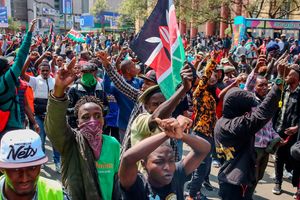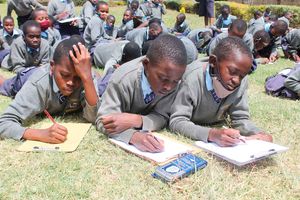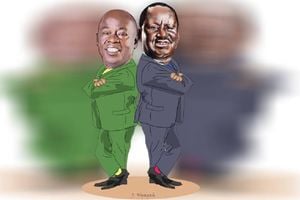
A girl stands in front of a 2024 illuminated sign displayed in Islamabad on December 29, 2023.
Undoubtedly, 2023 was a tough year for Kenya and the region — a classic annus horribilis or the terrible year. But 2024 carries no good tidings either. Kenyans should brace for a trickier and edgier world.
“It will be a nerve-racking and dangerous year,” the Economist magazine predicts. If there is a single word that aptly describes the world in the coming year, it is “volatility”. Successfully navigating through the bumpy world in 2024 will call for less haphazard policies, populism, dogmatism, religious bigotry and blinkered ideological alignments in the new Cold War — but for more pragmatism, rationality and long-term planning propelled by Kenya’s national interests.
Future-gazing analysts predict an exceptionally tough year for the world in 2024. Nostradamus — the renowned 16th century French astrologer, best known for his puzzling prophecies which often came to pass — predicted that 2024 will be a year of wars, civil unrest, economic hardships, geopolitical tensions and worsening climate crises. Kenya needs to hone its domestic and global agenda in six broad areas in order to successfully sail through the bumpy world in 2024.
First, Nairobi should adopt a pragmatic approach to the implementation of President William Ruto’s bottom-up economic model to halt the country’s slide to economic failure and possible political unrest. The global economy is predicted to slow down in 2024. Kenya is not immune to this trends. So far, its shilling has been on a free-fall against the dollar.
Although predicted to grow by 6%, high interest rates, debt, high spending and taxes and shrinking investments will heighten extreme poverty, unemployment and income inequality, creating a highly restive population.
Nairobi should chart a radically different policy path to halt the country’s slide to the precipice and realise Vision 2030,.
This calls for less populism, dogmatism, spin-doctoring, personal whims or idiosyncrasies in implementing the bottom-up economic plan, the fourth Medium-Term Plan in the delivery of Vision 2030. This will make the bottom-up economic plan feel like a square peg in a round hole, creating a worse crisis than in “the lost decades” of the 1980s and 1990s. Clearly, more pragmatism and inclusive policy processes driven by national interests.
Second, the country needs a refurbished foreign policy strategy to navigate through the turbulent multi-polar world in 2024 and beyond. Kenya should have “no permanent friends or permanent enemies but only permanent interests.” Kenya’s Western partners will still matter , but a blinkered ‘Look-West’ policy will shrink diplomatic space and options, hampering pursuit of national interests.
America still has the largest economy, but its unipolar moment has ended, its allies in Europe and Japan are in relative economic decline, and the West’ s share of world economy has hit a 50% low. In contrast, China and Russia have effectively challenged US global hegemony. Other great powers in the Global South such as India, Turkey and Brazil have become assertive in global governance.
China, the world’s second biggest economy, is projected to have an average GDP growth rate of 4.45% in the 2024- 2025 period. India will be among the world’s fastest-growing countries, registered a GDP growth of 6.5 per cent during the 2024-25 fiscal period. With South Africa, Egypt and Ethiopia in the BRICS, Kenya and Nigeria will be the lonely regional powers outside the world’s most consequential bloc controlling over half of the world’s population, wealth, and trade. Nairobi should recalibrate and re-orient its diplomacy to a revamped Look South policy to fully benefit from emerging markets in the rising Global South.
Third, with America’s “unipolar moment” gone and more complex conflict on the rise, Kenya should invest strategically in making its volatile Northern counties, hotspots in its Eastern Africa neighbourhood and Sahel belt safe for development.
Fourth, in view of the coming US presidential election, Kenya should adjust its foreign policy to transact in a world defined by a global surge of isolationism and populism. The world has a rendezvous with populism in 2024. Donald Trump has a one-in-three chance of winning America’s make-or-break presidential race.
If elected, he will weaken the Western coalition and change Washington’s climate policy. The coming election and war in Gaza will slow down the plan to contain a rising China. Kenya should avoid getting sucked into the Sino-American geopolitical competition.
Fifth, with the world in the cusp of a clean-energy transition and Kenya as a champion of climate-friendly policies and green growth, Nairobi should craft a strategy to ensure it becomes a winner — and not a loser. The ongoing clean-energy transition will change the global energy-consumption patterns, reshuffle trade flows and create winners and losers. The wild card is that the climate debate could well be an elite conspiracy against the ordinary people in the Global South.
Finally, the people of Kenya should defend their democracy from creeping authoritarianism and trend to remove constitutional curbs on third terms, heralding the return of sit-tight presidents. In 2024, more than 4.2 billion people, more than half the world population, in over 70 countries will cast their ballots. This democratic wave will neither foster free and fair nor stability. Instead, these elections will reward the corrupt and incompetent rulers and crony regimes.
Prof Peter Kagwanja former Government Adviser (2007-2013), and currently Chief Executive at the Africa Institute, Adjunct Professor at the University of Nairobi and visiting scholar at the National Defence University — Kenya.










